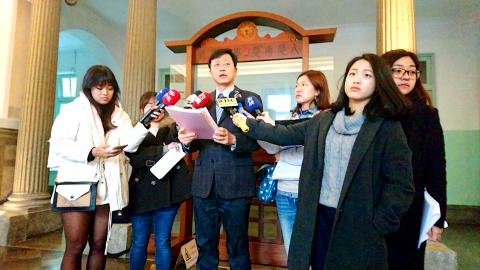National Taiwan University (NTU) yesterday released stage-two investigation results on an academic fraud scandal involving professor Kuo Min-liang (郭明良), which saw the university move to fire Kuo and professor Chang Cheng-chi (張正琪), while clearing NTU president Yang Pan-chyr (楊泮池), who cowrote four problematic papers published by Kuo’s team.
Two internal investigation teams and an investigation committee comprising members from outside the institution found that Kuo’s research team presented a host of misleading images in six papers, of which two have been retracted by science journals Nature Cell Biology and the Journal of Biological Chemistry.
The sheer number of problematic images was proof that Kuo “purposefully” added them to the papers, the report said.

Photo: Hsiao Yu-hsin, Taipei Times
The problems manifested in 2006, when Kuo — as the papers’ corresponding author — was responsible for supervising research work, but he chose to neglect the issue and involved a number of his graduate, doctoral and postdoctoral researchers in the presentation of more errors, it said.
The university decided to dismiss Kuo, who should assume “the greatest and ultimate responsibility,” it said.
Chang, whose name was absent from the first-stage investigation results, duplicated and improperly edited several images in four papers, including the 2008 article, of which she was the lead author, the investigation found.
She has been disqualified as a professor, dismissed, barred from re-applying for a teaching position at the university for five years and prohibited from requesting research grants from the school for five years.
Yang, who coauthored four problematic papers, “bears no responsibility” for the falsified data presented in the papers and therefore “has no reason to resign,” the university said.
In a 19-page report, the committee said Yang only provided some general advice on the direction of the research and his clinical insights on the four papers.
Yang’s involvement was limited to the parts he contributed and coauthors were responsible for checking their contributions to the paper, the committee said.
“By a vote of six to zero, our committee concluded that, based on Ministry of Science and Technology regulations, Dr Yang bears no responsibility for the manipulated figures that mainly involve immunoblots,” the committee said.
One of the questions the committee said it assessed was whether Yang should resign in the way former Minister of Education Chiang Wei-ling (蔣偉寧) did over an academic misconduct scandal 2014.
The question has been raised by educators who called for Yang to step down.
Chiang was unknowingly listed by his former student Chen Cheng-wu (陳震武) as a coauthor in a fake online peer review ring Chen helped create in an attempt to have work published by international journals.
Yang’s case fundamentally differs from the earlier case in the nature and the magnitude of the offense, the committee said.
“Therefore, we feel that it is inappropriate to suggest that, based on this earlier case, President Yang should resign,” it said.

The US government has signed defense cooperation agreements with Japan and the Philippines to boost the deterrence capabilities of countries in the first island chain, a report by the National Security Bureau (NSB) showed. The main countries on the first island chain include the two nations and Taiwan. The bureau is to present the report at a meeting of the legislature’s Foreign Affairs and National Defense Committee tomorrow. The US military has deployed Typhon missile systems to Japan’s Yamaguchi Prefecture and Zambales province in the Philippines during their joint military exercises. It has also installed NMESIS anti-ship systems in Japan’s Okinawa

TRAGEDY STRIKES TAIPEI: The suspect died after falling off a building after he threw smoke grenades into Taipei Main Station and went on a killing spree in Zhongshan A 27-year-old suspect allegedly threw smoke grenades in Taipei Main Station and then proceeded to Zhongshan MRT Station in a random killing spree that resulted in the death of the suspect and two other civilians, and seven injured, including one in critical condition, as of press time last night. The suspect, identified as a man surnamed Chang Wen (張文), allegedly began the attack at Taipei Main Station, the Taipei Fire Department said, adding that it received a report at 5:24pm that smoke grenades had been thrown in the station. One man in his 50s was rushed to hospital after a cardiac arrest

PUBLIC SAFETY: The premier said that security would be tightened in transport hubs, while President Lai commended the public for their bravery The government is to deploy more police, including rapid response units, in crowded public areas to ensure a swift response to any threats, President William Lai (賴清德) said yesterday after a knife attack killed three people and injured 11 in Taipei the previous day. Lai made the remarks following a briefing by the National Police Agency on the progress of the investigation, saying that the attack underscored the importance of cooperation in public security between the central and local governments. The attack unfolded in the early evening on Friday around Taipei Main Station’s M7 exit and later near the Taipei MRT’s Zhongshan

ON ALERT: Taiwan’s partners would issue warnings if China attempted to use Interpol to target Taiwanese, and the global body has mechanisms to prevent it, an official said China has stationed two to four people specializing in Taiwan affairs at its embassies in several democratic countries to monitor and harass Taiwanese, actions that the host nations would not tolerate, National Security Bureau (NSB) Director-General Tsai Ming-yen (蔡明彥) said yesterday. Tsai made the comments at a meeting of the legislature’s Foreign Affairs and National Defense Committee, which asked him and Minister of National Defense Wellington Koo (顧立雄) to report on potential conflicts in the Taiwan Strait and military preparedness. Democratic Progressive Party (DPP) Legislator Michelle Lin (林楚茵) expressed concern that Beijing has posted personnel from China’s Taiwan Affairs Office to its